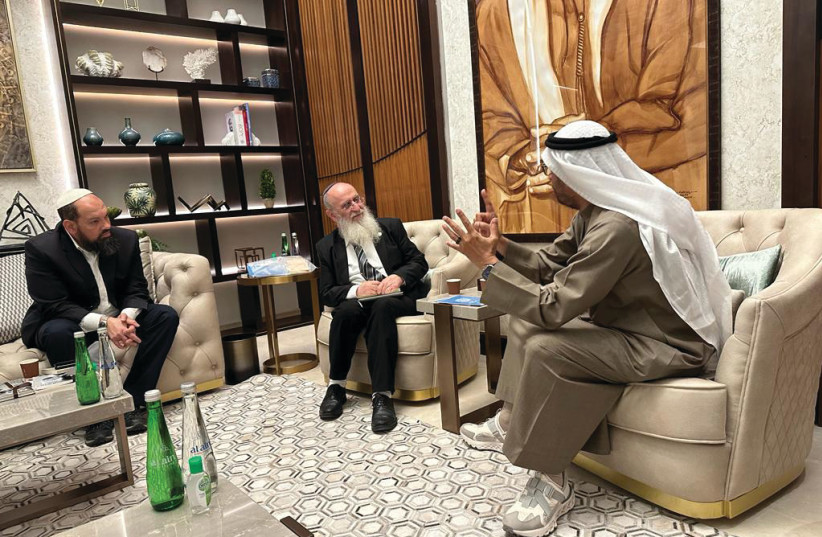Recent events at the UN and the evolving dynamics between the American and Israeli governments underscore a significant influence of the US election cycle on the trajectory of the conflict with Hamas.
President Joe Biden’s strategic moves and statements, molded within the electoral landscape, hint at a shift where electoral considerations affect Israel’s position for the first time.
This necessitates a recalibration of Israel’s approach. Amid various proposed strategies, including Israeli commentator Amit Segal’s suggestion to engage with emerging Democratic Party influencers such as Asian and Hispanic minorities, there’s a notable omission of a crucial minority – the Muslim community in the US, totaling approximately four million individuals and growing.
Surprisingly, within this community lie potential partners who grasp the broader agenda behind Iran and Hamas’s efforts to transform what is now a local conflict with religious aspects into a religious world war in which they are managing our local front. The aim is reestablishing a medieval-style Islamic caliphate, and Iran and Hamas could not care less about the Palestinians, or a Palestinian state, which they merely use as a tool to promote their larger vision.
Over 15 years ago, I founded Garin Shuva on the Gaza border. On October 7, I went out to protect my community (with almost bare hands) and then attended to the wounded who kept coming from Be’eri, Nahal Oz, Kfar Aza, and the Supernova Festival. I then moved on to several months of IDF reserve duty as a combat medic in the North. I am well aware of the evil we are facing, and can hardly be accused of being naive about it.

Working with peaceful Muslim allies helps us isolate extremists
WHAT CONCERNS me are the truly naïve voices who believe Israel and the Jewish People could, and should, declare a full-fledged war on the entire Muslim world. These voices advocate for a simplistic narrative, calling for a broad confrontation with the Muslim world based on selective interpretations of Islamic texts while ignoring the diverse perspectives within Muslim communities. Furthermore, they overlook a fundamental fact – for every Jew in the world, there are approximately 100 Muslims. Engaging in a global religious war is an unaffordable luxury with dire consequences, and it is unclear what those who advocate for it wish or hope to gain.
Instead of falling into the traps laid by agents of chaos, such as Iran and Hamas, Israel should seek allies within the Muslim world. Notably, there exists a nuanced internal struggle within Muslim communities between regressive and progressive forces. The latter views Israel as a potential partner in connecting with the Western world. By recognizing this, we can foster stability and dialogue.
Recent initiatives, such as a groundbreaking delegation of Israeli rabbis and American imams to Morocco, underscore the potential for fruitful collaboration. This diverse delegation, co-sponsored by the Ohr Torah Interfaith Center, engaged with Moroccan leaders, conducted historic ceremonies, and hosted interfaith events, emphasizing the importance of cooperation in fostering peace.
Taking place during the holy month of Ramadan, the program allowed Jews and Muslims to enjoy the traditional Iftar meal together in a spirit of unity and collective understanding. The main event was an Iftar in Rabat with close to 150 dignitaries from all over the country in the presence of US Ambassador to Morocco Puneet Talwar, who said that interfaith work is of utmost importance at this moment in history and encouraged the delegation’s participants to carry on their crucial work. Furthermore, I was invited to another Iftar in New York, by Imam Muhammad Shahidullah, who runs a training program for imams spread throughout the country. And there are more.
While peace may not be imminent, rejecting the outstretched hand of such moderate Muslim allies would be a disservice to future generations.
Collaborating with such partners offers a path to isolate extremist elements while advancing mutual understanding and peace. This should be seen as part of a long-term process to promote deep and historical reconciliation between Jews and Muslims.
It is inspired by the 1965 Nostra Aetate declaration, which effectively ended two millennia of hostility between Jews and Christians. If someone had told my grandparents in Europe that one day Jews and Christians would be close allies, that person would have been laughed at.
It is not inconceivable, then, that two or three generations down the line, Jews and Muslims could be partners as well.
If we want to get there, we need to set the trajectory sooner rather than later.
The writer is the managing director of the Ohr Torah Interfaith Center, a division of Ohr Torah Stone.
